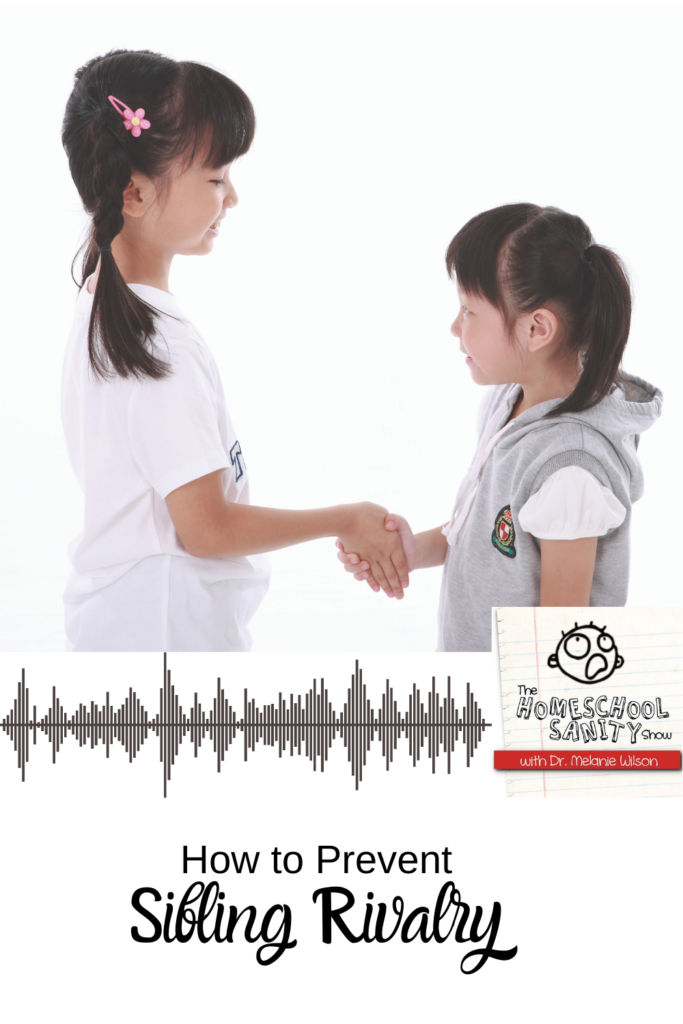I know that sibling squabbles are a serious source of stress. I know this personally and professionally. I have been giving a talk for Great Homeschool Conventions on how to negotiate sibling conflicts, but I think it’s important to talk about how to prevent these conflicts in the first place.
To begin, let’s look at Scripture. The first account of sibling rivalry in Scripture is with Cain and Abel. Genesis 4 reads:
Now Abel kept flocks, and Cain worked the soil. In the course of time Cain brought some of the fruits of the soil as an offering to the Lord. And Abel also brought an offering—fat portions from some of the firstborn of his flock. The Lord looked with favor on Abel and his offering, but on Cain and his offering he did not look with favor. So Cain was very angry, and his face was downcast.
Then the Lord said to Cain, “Why are you angry? Why is your face downcast? If you do what is right, will you not be accepted? But if you do not do what is right, sin is crouching at your door; it desires to have you, but you must rule over it.”
Now Cain said to his brother Abel, “Let’s go out to the field.” While they were in the field, Cain attacked his brother Abel and killed him.
Cain didn’t answer the Lord, but if he had, I think he would have said he didn’t feel secure in God’s love for him. This insecurity is the source of not just sibling rivalry but a distant relationship with God. How should we address this insecurity as parents? I think this passage gives us three strategies.
Three Strategies for Preventing Sibling Rivalry
First, we have to acknowledge the problem.
God doesn’t ignore Cain’s pouty behavior and neither should we. Our kids’ emotions are symptoms of a deeper problem that will not improve if ignored.
Some parents because of personality or past experience want to avoid conflict and emotional issues. It’s easier and quicker to tell yourself that it will improve with time. When I was a kid, my friend showed me a red streak that started at a cut and was making its way up her arm. I told her not to worry about it. Good thing I decided against medical school! My friend had an infection that was spreading. The infection needed to be treated or her life was at risk.
In the same way, our kids’ conflicts have to be addressed or the long-term consequences can be grave. I’m as guilty as anyone of telling my kids to stop fighting so I can have peace. But in order to heal the conflict, we have to go deeper to discover what’s feeding it.
As I’ve helped my kids work through their conflicts, I’ve found that rejection and hurt at not feeling loved by a sibling is a common source of conflict. When a child feels that a parent doesn’t love them enough to address the problem, the conflict will intensify.
As parents we have to remember that the conflict is rarely about possessions or game time. It’s about feeling loved and accepted. If our child isn’t secure, there will be sibling rivalry. (See posts 1 and 2 on conflict resolution skills.) You can use these principles to get your kids talking about the real problem.
Affirm our love and acceptance.
After acknowledging the problem, the second principle we can take from this account in Genesis is to affirm our love and acceptance of our kids. Cain had done wrong, whether it was bringing the wrong sacrifice or bringing it with the wrong attitude. We don’t know what the problem was, but his offering wasn’t good. Because he didn’t earn God’s favor with it, Cain falsely believed that God didn’t love and approve of him as a person. Notice how God focuses the attention on Cain’s behavior rather than on his person, saying, “If you do right, will you not be accepted?”
Ignoring bad behavior isn’t love. Disciplining is. But we have to reinforce the separation between behavior and the child. This faulty thinking of I am what I do seems to be hard-wired into our flesh. But we are valuable because we are created by God in His image. That is the truth of God’s Word. Nothing can change that.
In an episode of the show The Chosen, Mary returns to her sinful life and has to be brought back to Jesus by His disciples. As she weeps with regret, Jesus tells her that if one bad choice can undo the transformation He has made in her life, it wasn’t much of a transformation.
We must reassure our kids of the same. Correction may lead our child to assume they are bad, unlovable, unredeemable even. When much correction occurs, this view may be cemented in our minds and theirs. I’ve spoken before about my son who couldn’t communicate clearly before he was three. He was so frustrated by our inability to understand him, that he would scream.
That led me to give him the nickname “our little terrorist.” The book Raising Your Spirited Child by Mary Sheedy Curcinka helped me see the error in that. As I began labeling my son as spirited, my feelings about him changed. I had more compassion and appreciation for his temperament. I still didn’t want him to scream, but I wasn’t giving him a message of rejection.
I’ve heard many a negative nickname for challenging children. These unloving messages are being communicated to the child and adding to the insecurity, even if we aren’t labeling in their hearing. Make no mistake. Insecure children will act out. In fact, insecure adults act out, too.
Like God, we have to affirm to our kids that we love them always and forever, apart from what they do. Then we have to model that in our actions. How can we do that?
First, discuss what wrongdoing really means. Our cancel culture tells us that doing wrong means rejection with no redemption. But in God’s kingdom, wrongdoing means that we stopped trusting in Jesus and trusted in ourselves instead. We got off track. The way back is to confess it, asking forgiveness from God and anyone else we have hurt. We then ask God to enable us to live right and we trust that He will. This process will be repeated over and over. We are restored in our relationships and we believe that the Lord will continue to make us more like Jesus as we return to Him.
Next, we have to talk about our own history of getting off track. We also model the right response to our bad behavior by asking for forgiveness when it occurs. When I lost my temper with my kids and apologized, I noticed that they readily offered forgiveness. They didn’t expect me to endlessly berate myself for it. They wanted me to behave as though I had been forgiven and had a fresh start. This model is more powerful than any words we can say to reassure our kids.
Finally, we can truthfully affirm our love for our kids’ uniqueness. On our kids’ birthdays, each member of the family (and others celebrating with us) shares what we love about the birthday boy or girl. The appreciation is specific from a sibling saying she appreciates that her brother is always willing to do fun things with her to recognizing a readiness to laugh at oneself. Not only does this tradition affirm a child where he is but it reminds all family members of our shared values. It motivates all of us to live those values.
Apart from birthdays, we can affirm each of our children for their gifts and contribution. We might say, “You help me when you read to your sister and I can tell she loves it, too.” “You’ve become more mature and I can trust you with more responsibility.” “I know God is going to use your strong will in leadership one day.” Children remember these words more than they remember careless words we speak in a stressful moment. We can turn a child’s insecurity around quickly. I asked my father-in-law to write letters of affirmation for each of his children before he passed. I believe these letters contributed to the lack of rivalry the family experienced in settling his estate and continued closed relationships. You and your spouse could write letters of affirmation on a regular basis to each child.
Praying with and for a child is yet another way of affirming them. Pray out loud for help in supporting your child to be what God has created her to be. Let your child know that you pray for them in private, too, and ask for specific prayer requests. I continue this with my adult children who no longer live at home. It’s a powerful way to maintain their security.
This passage from Genesis 4 teaches us to acknowledge a problem and to affirm our love for our kids.
But it also teaches us that our kids make independent responses.
Despite God’s intervention, Cain kills his brother. That seems like a downer way of ending this episode, doesn’t it? But I mean for it to be uplifting. We can and should provide love and support to our kids to prevent sibling rivalry. But ultimately our kids have to respond to the love that is freely offered to them.
When we see that a child is resistant to that love and still insecure, the temptation is to keep reassuring them and to go overboard with our expressions of love and approval. God didn’t do that with Cain. We shouldn’t either. We model our own security by allowing our child to grasp the truth on his own. You’ve heard the expression “more caught than taught.” It applies to security.
Some children need long-term evidence that they are loved. They will test it because if they’re going to be rejected, they want the pain to be over with quickly. As parents we need support in continuing to love a child through these tests. Ask friends and extended family to pray for you. Talk it out. And consider getting counseling if your child is particularly challenging.
Conclusion
I have always marveled at God’s response to Cain after he murdered his brother, and it’s one we can share with our insecure kids. God punished Cain, but He also promised to protect him. I think Cain realized his mistake in not trusting God’s love as he says that being out of the Lord’s presence is part of the punishment that was more than he could bear. Praise be to God that we each have this assurance from James 4:8: “Draw near to God and He will draw near to you.”







